
With negotiations in their second week here at the COP30 climate conference in Belém, Brazil, we get an update on the United Nations talks from Asad Rehman, chief executive of Friends of the Earth. He says COP30 is taking place against a backdrop of rising far-right authoritarianism, climate denial, and genocide in Gaza, which are all testing the “rules-based system” underpinning the U.N. climate framework. “How do you celebrate 10 years of Paris, 30 years of COP, to show that, actually, multilateralism matters and implementation matters?” says Rehman of the central challenge of the talks.
Transcript
AMY GOODMAN: This is Democracy Now!, democracynow.org. I’m Amy Goodman. We’re broadcasting from the U.N. climate summit from the Brazilian city of Belém. It’s the gateway to the Amazon.
To look at the state of the negotiations and more, we’re joined by Asad Rehman, the chief executive of Friends of the Earth, longtime climate justice campaigner, previously executive director at War on Want.
We welcome you back to Democracy Now! Thanks so much for being with us.
ASAD REHMAN: Always a pleasure, Amy.
AMY GOODMAN: So, you’ve been here through the summit. Explain what we should understand. What are the negotiations that are being — that are taking place? What is the theme of this COP30?
ASAD REHMAN: So, just to take a step back, and first, obviously, we’re meeting here when the very rules-based system, whether it’s from Gaza to climate, is under threat, where, obviously, we’ve seen the rise of far-right authoritarianism and fascism, Donald Trump and climate denialism in being one, and this weaponizing of anti-Muslim, anti-migrant and anti-climate being part of the backdrop. And that’s been one of the sort of drivers here about: How do you celebrate 10 years of Paris, 30 years of COP to show that actually multilateralism matters and implementation matters? Look, we’ve heard from the ICJ that there is a legal and a moral obligation for countries to act, both on mitigation, adaptation. They have a responsibility, not only for the polluter pays and doing their fair share, but also to do no harm.
AMY GOODMAN: And, of course, the ICJ is the International Court of Justice —
ASAD REHMAN: Yeah.
AMY GOODMAN: — at The Hague.
ASAD REHMAN: So, absolutely. So, I would say there are three issues that are across in every negotiating room here. One is fairness. How do the people, whether they’re in Kingston, Manila or Gaza, celebrate, if impacts are happening to them from extreme weather impacts to floods? What happens in terms of equity? Who’s doing their bit? Who’s missing? And, of course, the United States not doing their fair share, but also rich developed countries not delivering the scale of ambition that is required.
And then the critical question of finance. We all know finance is needed. And what we saw in Baku, yes, last year was, you know, a lot of promises on private finance, on mobilizing. But really what is required is: Who’s actually going to provide the support? And so, the cost of inaction, we know, is really in the trillions. Will there be money here? And some of those negotiations, of course, are not happening here in Belém. They’re happening in Nairobi at this very same moment, when there is a debate and discussions going on about a U.S. — U.N. tax convention. And the very countries that are refusing to pay for climate finance here are also blocking action that would provide the hundreds of billions that are needed. Look, Brazil’s government came here and said they’ve got what they call the Fab Four provision of finance, making sure that unilateral measures such as trade measures are equal, can they close the ambition gap, and can there be transparency, not only in reporting what countries are doing, but also on the question of finance. We’ve heard for a long time lots of words from developed countries saying, “We’re providing lots of money,” but when we lift the hood, we know that it’s a lot of double counting. A lot of that finance isn’t very real. So we need transparency on finance.
The negotiations are still continuing, and now ministers will start to meet, ministers from both the rich developed countries and developed countries, to close the gap on what is called the seven key issues. Those will be the global stocktake. Are we — how close are we to meeting the ambition needed on 1.5? The critical issue of global goal on adaptation: How do we adapt to the fact that the world is changing, extreme weather, inequality, ecosystems collapsing? What are we going to do about the just transition? How do we ensure we have a plan about the transition that works for people, communities, countries and workers, and then, of course, making sure, whether it’s in mitigation, technology and finance, including on gender, that there is progress. So, those things are going to happen.
The hope is there are actually some really concrete road maps here. We’ve heard a lot about global goal on adaptation, a critical issue for developing countries. We had 5,000 indicators. They got down to a thousand indicators. We’re now down to a hundred indicators. But indicators without the finance, without the means to implement, will just be meaningless. So, what developing countries are saying here is we need a road map on adaptation.
On the just transition work program, there’s a demand. It’s been echoed by civil society and by the developing countries, the G77, saying we need a Belém action mechanism. This sounds like a technical term, but really what it means is that there will be not just coordination, but actually a concrete plan that allows people to plan about how we manage this change and ensure everybody has a right to live with dignity and in harmony with our planet.
Now, the third thing is on fossil fuels. Now, fossil fuels themselves aren’t in these negotiations as such, but there are countries coming here, like Colombia, that are saying, “We’ve got a road map.” We can ensure that we can move away from fossil fuels, but that, of course, requires us to have finance. It requires us to understand the diversification for lots of countries who are relying on fossil fuels, and, of course, recognizing that for many countries, including developing countries, they’re trapped in a cycle of debt, which means that they keep having to exploit their fossil fuels. So, if we want to end that, we need a plan on that, as well.
AMY GOODMAN: Well, we’re going to have to leave it there for today, but we are here all week. We’re talking about the climate catastrophe and what people are doing about it. I want to thank Asad Rehman, now chief executive of Friends of the Earth. That does it for our show, as we broadcast from the U.N. COP30 climate summit in the Brazilian city of Belém, the gateway to the Amazon. I’m Amy Goodman.

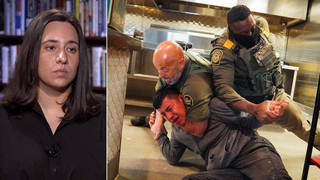
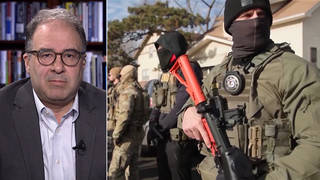
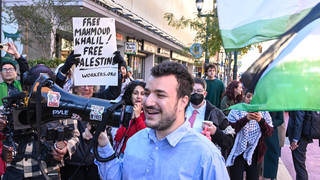
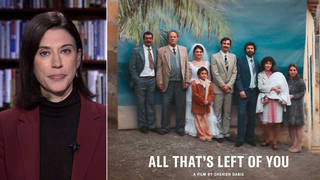



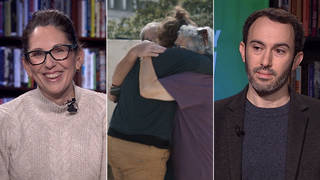



Media Options